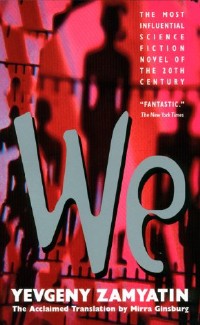
The much more interesting but lesser known dystopian novel that inspired George Orwell’s 1984.
Not as prophetic as Aldous Huxley’s Brave New World but it’s more consistently well written and has mostly aged better.
It’s more open to interpretation than I was expecting.
The translation I’m reading by Mirra Ginsburg is based on an older version of the text (potentially censored in some way).
I’d love to read a more recent translation if only to see how they deal with the racist black caricature character and other stuff.
I’m about three quarters of the way through the text, so far so good.
I doubt it was the intention hehe but reading it as a specifically trans story is interesting. The main character D-503 lives in a dystopian society based on 1920s Soviet Russia. A society that is built upon conformity and unity of action, it expects people to act as identical cogs in the machine.
Why does a trans reading work IMO? Throughout the novel, our protagonist D-503 begins to diverge from this uniformity through some means outside of his control (he gets a soul) and also begins to experience a form of body dysmorphia (and also his hairy palms).
Great works of art can be re-interpreted and re-evaluated throughout time. Art does not exist in a vacuum, art exists and manifests itself within the experience of the person experiencing the art.
My recent foray into slav sci fi (Stanislaw Lem’s Solaris and The Futurological Congress, Strugatsky Brothers’s Roadside Picnic and Yevgeny Zamyatin’s We) has been quite fruitful. I’ve vibed with these works in a bunch of different ways. They’ve tended to be shorter works that don’t waste time and are more than just a sequence of events like a lot of modern sci fi seems to be these days.
Low key goated. It’s a great book, highly recommend this and I REALLY want to read another translation of the text.